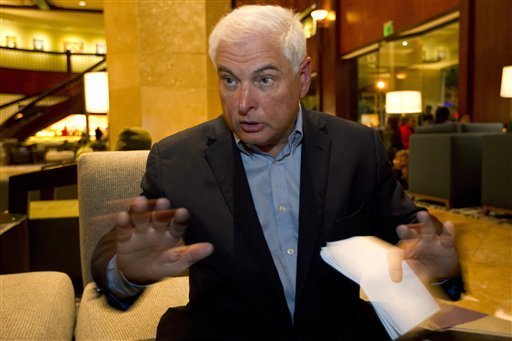Here is a great story by Robert McMillan, former chairman of the Board of the Panama Canal Commission.
Panama, one of the United State’s most reliable Latin American partners, recently issued a warrant for the arrest of a former president, Ricardo Martinelli, claiming that he committed numerous high crimes during his 2009-2014 tenure, including using a domestic surveillance system to spy on his political opponents. That the U.S. is a bit player in this unfolding national drama is not surprising: bilateral commercial, security, and political relations with Panama run long and deep. As a matter of fact, the U.S.’ refusal to play ball with Martinelli’s paranoid demands to wiretap his opponents is a testament to the enduring strength of America’s special relationship with Panama, which goes back more than a century.
Little more than a year ago, we celebrated the 100th anniversary of the opening of the Panama Canal, an event that transformed global commerce and trade and led to the solidifying of a relationship between the U.S. and Panama that has grown stronger by the day through our broad economic, security, and political cooperation. Panama is the fastest growing economy in the region, and the United States is their largest trading partner– we account for approximately 23 percent of all Panama’s two-way trade. U.S.- Panama trade grew by roughly 20 percent to more than $10 billion in 2012 and has only continued to increase since the U.S.-Panama Trade Promotion Agreement (TPA) went into effect in October 2012. The much-anticipated expansion of the Panama Canal will only enhance the importance of U.S.-Panama trade and the jobs it will support in both countries.
There is also widespread security cooperation between the two countries. It actually was through a partnership with the U.S. Drug Enforcement Agency (DEA) that President Martinelli first proposed his potentially illegal domestic surveillance program. According to leaks from the office of Barbara Stephenson, the American ambassador to Panama at the time, Martinelli demanded that the DEA use its wiretapping program, known as Matador, to help him “tap phones.” Martinelli, it seems, believed that scores of Panamanian journalists, students, clergy, political figures, business people and others were plotting to kill him.
The United States refused Martinelli’s demand, which created rare tension in an otherwise solid relationship. Considering that over 10 percent of all U.S. shipping goes through the Panama Canal, and joint counter-narcotics programs have been effective in stopping the flow of drugs and crime into the U.S., the stakes for U.S. refusal were considerable. Indeed, Ambassador Stephenson’s diplomatic cables, leaked and published in 2011, describe a breakdown in intelligence relations between Panama and the U.S.- beginning in 2009, the year Martinelli took office and allegedly began pressing the U.S. for wiretapping assistance.
At one level, the Martinelli affair represents a rare political black eye on a regional democratic success story. Since the U.S.-assisted deposing of the dictator and drug-trafficker Manuel Noriega in 1989, there has been a succession of democratically elected leaders from left, right and center. Voter turnout is high. Martinelli’s illegal tactics are an anomaly in this story; his alleged crimes smack of executive hubris, lack of accountability, and disdain for democratic principles. But Panama has shown the strength to withstand this challenge. The diligence with which the Panamanian judicial system has sought to bring Martinelli to justice demonstrates a strong commitment to due process and the rule of law. And while Martinelli’s tenure in office was ended by term limits in 2014, he was succeeded by a candidate, Juan Carlos Varela, who broke from Martinelli’s coalition government to pursue an active opposition from within. Varela ran and won on an anti-corruption platform against a ticket that included Martinelli’s wife.
Panama’s efforts to fight corruption go far beyond this high profile case and it is in America’s interests—particularly the commercial sector—to support them. In this regard, the Varela Administration has proposed legislation that would reform Panama’s procurement laws to make the process more transparent and competitive. That’s very good for U.S. businesses, who will now benefit from a true level playing field for their goods and services. The U.S. Government and pro-business entities like The U.S Chamber of Commerce and the Small Business Administration should back these efforts.
Despite the tension created by Martinelli’s pressure, the U.S. Panama commercial and security relationship has endured and thrived anew under President Varela. The completion of the expansion of the Panama Canal in 2016 will only further strengthen those ties. But in the end it is the shared commitment to democratic values that bind the U.S. and Panama. These are ideals that Panamanians have fought for through previous dictatorships and are defending today in their thorough, painful, but important investigation of Martinelli. We should support them.
